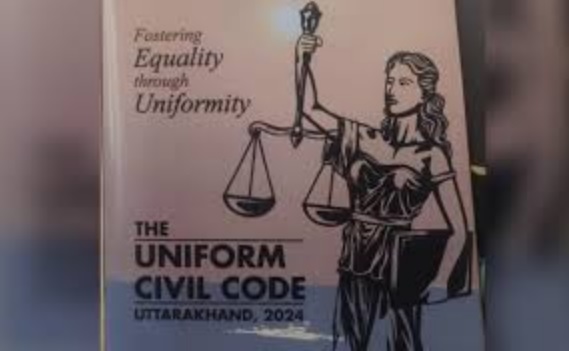
Uniform Civil Code (UCC) ensures equal marriage rights and prohibits polygamy
The legislation will apply to all individuals residing in Uttarakhand, defined as those who have been living in the state for one year or longer and are receiving benefits from either central or state government programs.
The draft Uniform Civil Code in Uttarakhand has suggested providing equal rights to both men and women in various aspects of marriage, divorce, adoption, alimony, and maintenance. Additionally, it proposes banning polygamy and setting a uniform marriageable age of 18 years for women and 21 years for men, applicable to all communities except individuals from Scheduled Tribes residing in the state.
It diverges from current legislation regarding personal laws, marriage, divorce, alimony, and ancestral property rights. The proposed code also outlines restricted relationships, encompassing immediate family members such as father, mother, grandfather, and grandmother, with the caveat that marriage between them may be allowed if governed by custom or usage, provided such customs and usage align with public policy and morality.
Relationships have been categorized as follows: half-blood (when individuals share a common ancestor but through different spouses), uterine blood (when individuals share a common ancestress but through different husbands), full blood (when individuals descend from a common ancestor through the same spouse), adoption, surrogacy or assisted reproductive technology, and illegitimate child.
The proposed code will not be applicable to Scheduled Tribes, as defined in clause (25) of Article 366 in conjunction with Article 342 of the Constitution of India, as well as individuals and groups whose customary rights are safeguarded under Part XXI of the Constitution of India.

“Custom and usage” are defined as any regulation that has been consistently and consistently followed for an extended period, acquiring legal validity among individuals within a particular local area, tribe, or community. However, such practices must not be unreasonable or contrary to public policy and morality. Among Uttarakhand’s five officially recognized tribal communities, the Jaunsari community, tracing their lineage to the Pandavas of the Mahabharata, argue that polyandry has been instrumental in preserving their ancestral lands and properties, particularly due to limited land availability in the state for agricultural purposes.
Any marriage conducted in Uttarakhand between March 26, 2010, and the commencement of the new code, involving at least one resident of the state at the time of marriage, must be registered under the new legislation, with the sole exception being if the marriage has already been registered under the Uttarakhand Compulsory Registration of Marriage Act, 2010.
The legislation will apply to all individuals residing in Uttarakhand, defined as those who have been living in the state for one year or longer and are receiving benefits from either central or state government schemes.
At the time of marriage, it is stipulated that men should not have a living wife and women should not have a living husband. Both parties should be of sound mind, as proposed by the code. The code permits marriages under various religious forms, including nikah (Muslim marriage), saptpadi (Hindu marriage), anand karaj (Sikh marriage), or any other religious ceremony not prohibited under the proposed code.
All marriages must be registered within a 60-day period. According to the draft code, providing false information during registration carries a penalty of three months’ imprisonment and a fine of ₹25,000, while failure to register the marriage incurs a fine of ₹10,000.
Marriage dissolution cannot occur without a court order, with a potential penalty of up to three years of imprisonment. Violating the specified conditions for marriage dissolution may lead to a six-month jail term and a fine of up to ₹50,000.
According to the proposed code, divorce petitions must be submitted in a designated court, and the decree must be issued within 60 days. Both men and women will have the right to receive alimony and maintenance. Appeals can be made to the high court in instances where the family court issues non-consensual orders.
Political analyst SMA Kazmi noted that the inclusion of prohibited relationships in marriage will have an effect on the Muslim community, comprising 13% of the state’s population.
“The Uniform Civil Code overlooks the fact that the majority of matters concerning marriage, divorce, remarriage, adoption, and succession are already addressed by distinct personal laws governing Hindus, Muslims, Christians, and Jews. Therefore, the alteration primarily targets Muslims, particularly due to the occurrence of marriages within relations,” he remarked.
“Inheritance, marriage, and remarriage within the Muslim community would also face implications as the Uniform Civil Code encroaches upon their personal laws. This evidently indicates its intent to single out minority groups,” he further commented.
“The rationale behind uniformity is undermined by the exclusion of scheduled tribes in the second sentence of the bill,” Kazmi remarked. “If the bill’s provisions are beneficial for everyone, then why have scheduled tribes been excluded? This decision seems to stem from the BJP’s reluctance to alienate the significant scheduled tribe population in the country ahead of the general elections.”
Chief Minister Pushkar Singh Dhami stated, “Under the guidance and inspiration of PM Narendra Modi, today we are poised to fulfill the commitment (‘Sankalp’) we made to the people of the state during the 2022 assembly elections by introducing a Uniform Civil Code law in the state. Our government, with full responsibility and inclusivity towards all sections of society, has presented the UCC Bill in the Assembly. Uttarakhand is on the verge of a historic moment where it will become a strong proponent of PM Modi’s vision of ‘Ek Bharat, Shreshta Bharat’ (One India, Best India).”
As per a statement from the state government, “Should there be a constitutional necessity, this legislation will be forwarded to the President for approval prior to its enactment. The Uniform Civil Code is anticipated to emerge as a forward-thinking, widely embraced code in Uttarakhand. It is believed that this code will mark a significant milestone in the state’s progress.”

